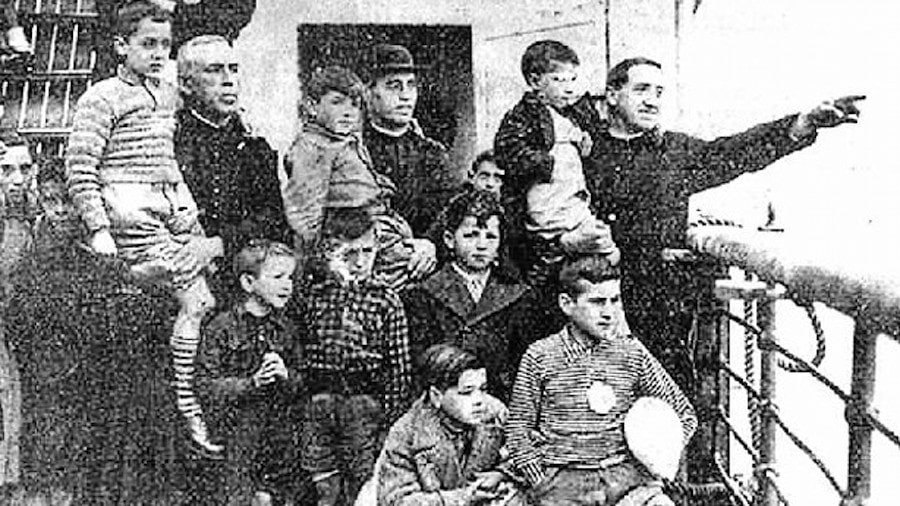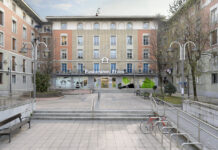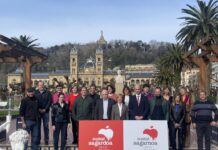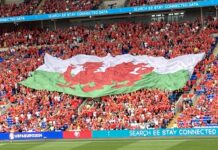For believers and non-believers. What we mean with this title, taken from the song by León Gieco, is that we hope to never lose our Humanity, to be able, in the right moments, to know that our Principles go beyond mere words and statements.
A few weeks ago, we wrote an entry titled: LOS VASCOS UN EJEMPLO DE REFUGIADOS ACOGIDOS. ESPERAMOS QUE TAMBIÉN DE EUROPEOS SOLIDARIOS ( The Basques are an Example of Refugees Taken In. We hope they’ll also be an example of Solidarity in Europe).
In it, we conveyed our opinion about Basque society’s role to play in the refugee crisis we’re currently experiencing in Europe. To do so, we looked back and compared what happened in 1937 to what’s happening now. The conclusion we reached was that we’re facing the same problems and the same people.
Today, the director of this blog has published an article in Deia, which he had been asked by the paper to write after having published his thoughts. We’re not big on “personalizing our thoughts and giving them a name”, but we thought the severity of the topic demanded a non-habitual posture.
We know there will be those who say “enough is already being done”, or even “too much is being done”. We’re frankly not capable of measuring it. We don’t have a ruler or scale which allows us to know that. All we have is the anguish we feel when we see so many human beings suffering that injustice while we as a society look away or close the door.
That’s why we made the decision to write the article that was published in the “Stories of the Basques” section, under the title Cuando los niños eran los nuestros (When the Children were Ours). You can find the link at the end of the article.
While we were writing it, this song, which is really so much more, was playing. It’s a hymn, a prayer, and a statement of principles.
Sólo le pido a Dios (Leon Gieco)
Sólo le pido a Dios
Que el dolor no me sea indiferente
Que la reseca muerte no me encuentre
Vacía y sola sin haber hecho lo suficiente
Sólo le pido a Dios
Que lo injusto no me sea indiferente
Que no me abofeteen la otra mejilla
Después que una garra me arañó esta suerte
Sólo le pido a Dios
Que la guerra no me sea indiferente
Es un monstruo grande y pisa fuerte
Toda la pobre inocencia de la gente
Es un monstruo grande y pisa fuerte
Toda la pobre inocencia de la gente
Sólo le pido a Dios
Que el engaño no me sea indiferente
Si un traidor puede más que unos cuantos
Que esos cuantos no lo olviden fácilmente
Sólo le pido a Dios
Que el futuro no me sea indiferente
Desahuciado está el que tiene que marchar
A vivir una cultura diferente
Sólo le pido a Dios
Que la guerra no me sea indiferente
Es un monstruo grande y pisa fuerte
Toda la pobre inocencia de la gente
Es un monstruo grande y pisa fuerte
Toda la pobre inocencia de la gente
Sólo le pido a Dios (Leon Gieco)
I only ask God
To not let me be indifferent to the pain
To not let gaunt death find me
Empty and alone, not having done enough
I only ask God
To not let me be indifferent to injustice
To not be slapped on the other cheek
After a talon scratched this luck of mine away
I only ask God
To not let me be indifferent to war
It’s a huge monster that crushes underfoot
All the people’s poor innocence
It’s a huge monster that crushes underfoot
All the people’s poor innocence
I only ask God
To not let me be indifferent to deceit
If a traitor can take on a few
That those few don’t easily forget
I only ask God
To not let me be indifferent to the future
He who is evicted has to leave
To live in a different culture
I only ask God
To not let me be indifferent to the future
It’s a huge monster that crushes underfoot
All the people’s poor innocence
It’s a huge monster that crushes underfoot
All the people’s poor innocence
Deia – 19/9/2015 – Euskadi
WHEN THE CHILDREN WERE OURS
The image of Guernica destroyed by the bombs served to make the world sensitive to the Basque children who were fleeing war; the photo of a child drowned on Turkish shores has had the same effect. The drama of today and of yesterday is the same.
The strength of a photograph, of a word, or of an image can become extraordinary. If the leaders of the Francoist insurrection had imagined that what they were planning to do on April 26, 1937 would have worldwide repercussions, it’s possible they might have acted differently.
Until then, they were used to their criminal actions having no practical repercussions beyond the empty complaints of Western democracies. From that moment on, they had to be more careful; even their allied governments (active and passive) also had to, as they didn’t want to look bad in the public eye because of the reckless actions of Francoist troops.
The crime they committed that day, the destruction of the martyr city of Guernica by the German and Italian planes serving the illegal government led by ex-General Francisco Franco, had a huge impact around the world. And it did so because there were journalists there who could tell the world what they had seen, and the world trembled when it learned what was happening in that corner of Europe.
George L. Steer and Noël Monks are two magnificent examples of how words can change the world. Their chronicles about the total destruction of a defenseless city hit the world’s conscious hard, and helped civil society in many parts of Europe to pressure their governments to open their doors to the arrival of refugees from the Basque front.
The British case is a clear model of how that concrete event helped change things.
Nicholas Rankin, the author of the book “Crónica desde Guernica: George Steer, corresponsal de guerra (Chronicles from Guernica: George Steer, War Correspondent)”, laid it out crystal clear in his 2011 talk at the annual conference organized by the Basque Children of ’37 Association of the UK (BC’37A UK) (available on their website).
Rankin lays out, brilliantly and highly readably, the cause and effect that connected the bombing of that Basque holy city, the article G. L. Steer published in The Times, and the arrival of Basque War Children to Great Britain. In this text, he also offers a detailed description of the debate between the greater part of British society and a government that clearly sympathized with the cause of Francoism (order and anti-communism). Civil society won the debate, and 4,000 Basque children were allowed to take refuge on the other side of the Bay of Biscay.
This social reaction was also fed by the reports of British non-professional eyewitnesses to the citizenry. It’s extremely interesting to read the chronicles British sailors transporting supplies to Bilbao (and thereby breaking the Francoist blockade) made about what was happening on the Basque front.
“Tell what you see”
To know their stories and their feelings about the barbarism they were witness to, to reading the series of article Sarah Richardson wrote on the blog of the Tyne & Wear Museums’ blog regarding the relationships between Newcastle and the Basques who were defending Democracy during the Spanish Civil War is highly recommended.
In her texts, we can see how the sailors in that city, with their long and deep historical links to Bilbao, narrate to local papers what they’d seen and lived in that Basque city that had been surrounded and bombed by Francoists. They even tell of their visit to the ruins of Guernica, taken by a Basque Government that was asking of them the same they asked of the journalists to the Basque front: “tell the world what you see, tell the world what the Francoists are doing”.
In Sarah Richardson’s three articles, we can also learn how the society of Newcastle reacted to get those children out of Bilbao and how they organized things so their arrival and stay would be carried out in the best conditions.
Those journalists, those sailors, those women and men of every class, ideology, and social condition were the bearers of Justice and Hope for the Basque who were suffering under the attacks of the Francoists and their allies. Those journalists, role models of being willing to risk it all to tell the truth, were those bearers. Those British sailors who visited the front and broke through the blockade of ships that were so brave against the armed trawlers and fishing boats of the Auxiliary Navy of Euzkadi, but then such cowards when facing the Royal British Navy, were those bearers. The labor unions, political parties, associations, Christian groups, people on the right or on the left, of all classes and social conditions, who understood that solidarity with those who were suffering injustice is so much more important that the realpolitik that Western governments practiced during the Spanish Civil War and the dictatorship that caused so much pain and hardship in the Basque people, were those bearers.
And it wasn’t just British society, thought I cite them here because I know their participation in this part of Basque history better. But the same thing happened, for example, in France and Belgium. The government of the USSR also played an active role, taking in many children to what at the time seemed to be a safe destination. Definitely, in 1937, the Basques, at least those who were on the side of democracy and freedom, knew what international solidarity meant.
And truth be told, we had an ace: a Basque Government that was able to organize the exile of that Basque population with an efficiency that will never be sufficiently valued, not least because many historians work to ignore or downplay the titanic effort they carried out in the harshest of conditions.
But that Basque Government couldn’t have carried that work out without the key collaboration of the Basques of the Diaspora, without the support of a handful of governments who opened their doors to those masses of refugees, and without the solidarity of the thousands and thousands of friends of the Basques whom we’ve never thanked well (or appropriately) enough for their work and commitment in such complicated times.
Today’s refugees
All of that happened not so long ago, in the time of our parents or grandparents, for most of this reading this paper. That’s what I recall those days when we find tens of thousands of refugees at the gates of Europe. I remember the stories preserved in my family about the difficulties my grandmother, my mother, and my aunt, turned into refugees with nothing but a bindle, embarking on an English ship to the Northern Basque coast, where the Basque Government was organizing the reception of those who could manage to feel the disasters of the war.
I recall all of this and how today we’re proud of having one of the highest per-capita incomes in Europe, of being an advanced, modern nation, where the crisis didn’t hit quite as hard as it did elsewhere.
I recall all of this and I wonder: What is it all for if it’s possible we’re turning into a country of selfish people, where Humanity and Commitment to those who suffer have been diluted by R&D statistics and the last quarter’s GDP numbers?
Those Brits organized the reception of 4,000 Basque children without the support of a government while in a deep economic crisis. We, today’s Basques, many of us who have family that lived in exile, watch TV or read the papers, and we get the feeling that those refugees at Europe’s gates have nothing to do with us.
Moreover, the excuses and hateful speeches that are being repeated, just adapted to today’s language, but carbon copies of the ones given in 1937, are terrible. At that time, there were those who were sure that taking in those children would be tantamount to introducing the poison of communism into Great Britain, or that those refugees had less cultural training and therefore would be unable to adapt themselves to a civilized place, creating conflicts with the locals. Today, we have to listen to the same disgusting speeches, where the only thing that’s changed is swapping “communist” for “jihadist”. The photo of that poor Kurdish child drowned on a beach seems to be playing a similar role as Steer’s or Monks’ chronicles on the destruction of Guernica, and have triggered a reaction of solidarity.
But there’s a big difference, a huge difference. We’ve been watching for years, for decades, how, at Europe’s gates, or even within Europe itself, those affected by war are barely scraping by trying to find a place to take refuge. We see it and we think, Someone has to do something! We expect our governments, our institutions, will do the work.
When will realize that that someone that has to do something is each and every one of us? In 1937, those boys and girls, men and women, the persecuted, the refugees, were us. Today, too.
Last Updated on Dec 20, 2020 by About Basque Country





